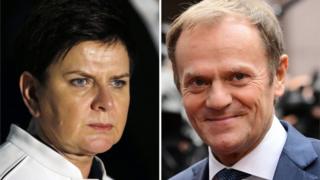 Image copyright
Image copyright
AFP
Polish Prime Minister Beata Szydlo says Mr Tusk has “violated multiple times his European mandate”
Poland has threatened to derail Thursday’s EU summit as it attempts to block the re-election of Donald Tusk as president of the European Council.
Prime Minister Beata Szydlo said nothing should be decided without Poland’s agreement.
The ruling Law and Justice Party (PiS) implacably opposes Mr Tusk, a former prime minister from a rival party.
Correspondents say such hostility among compatriots is highly unusual in EU politics.
But Mr Tusk is still expected to get enough support to keep his post.
German Chancellor Angela Merkel has backed a new 30-month term for Mr Tusk, saying it would be a “sign of stability”.
As European Council president, he would play a major role in the UK’s Brexit negotiations.
Thursday’s meeting of EU leaders in Brussels is the last that UK Prime Minister Theresa May will attend before formally launching the two-year Brexit process later this month.
Although Brexit itself is not on the agenda, leaders will meet again on Friday – minus Mrs May – to discuss EU unity.
What is Poland doing?
Poland’s government is desperately trying to prevent Mr Tusk from being re-elected to a second term as president of the European Council. Instead it has proposed its own candidate, a little-known Polish MEP called Jacek Saryusz-Wolski.
Arriving for the summit, Ms Szydlo said Poland’s voice had to be heard.
“Nothing should be decided without our consent,” she said.
“Today in this building it would be good to recall this main principle of community building.”
In an interview earlier with Polish television, Foreign Minister Waszczykowski said his country could even thwart the entire summit over its opposition to Mr Tusk’s re-election.
Asked whether Poland would veto the summit’s conclusions in order to scupper the re-election, Mr Waszczykowski said this was “journalistic speculation” but that this tactic was “possible”.
Image copyright
AFP
Poland’s government has backed a rival Polish politician, Jacek Saryusz-Wolski, to replace Mr Tusk
Ms Szydlo has also written a letter to EU leaders saying Mr Tusk has “violated multiple times his European mandate” by getting involved in Polish political disputes and supporting the opposition to the government.
The EU has angered Poland’s nationalist government by criticising changes to the country’s top court, new restrictions on journalists and its opposition to resettling refugees by quota.
Why is the Polish government so hostile to Mr Tusk?
Mr Tusk was prime minister from 2007-2014. He led the centre-right Civic Platform when the PiS was in opposition.
PiS leader Jaroslaw Kaczynski holds Mr Tusk “politically” responsible for the 2010 plane crash in Russia which killed his twin Lech Kaczynski, the then Poland’s president, and all other 95 people on board.
The plane crashed in dense fog. Official investigations ruled pilot error was the principal cause.
In 2012, Jaroslaw Kaczynski told Mr Tusk in parliament: “In the political sense you bear 100% responsibility for the catastrophe in Smolensk.”
Many Poles believe Mr Tusk’s government did not do enough to explain the causes of the crash. Critics say Mr Tusk should not have allowed the Russians to conduct the first crash investigation.
Under the Chicago Convention, which covers international air travel, the state on whose territory a crash occurs bears responsibility for conducting the investigation.
Jaroslaw Kaczynski also accused Mr Tusk of favouring “solutions that are extremely harmful to Poland”.
What does the European Council president do?
The European Council brings together the heads of state and government of the 28 EU member states. Jointly they set the EU’s strategic direction in key areas, such as reform of the eurozone, the Greek debt crisis, the migrant challenge and relations with Russia.
The Council president aims to achieve consensus – deploying all his diplomatic skills – on these tricky issues, where national tensions often dictate how leaders behave.
Mr Tusk took charge in late 2014 and his term ends on 31 May. If his fellow leaders back him on Thursday, he will stay in office until 30 November 2019. That period coincides with the expected two-year Brexit talks on UK withdrawal from the EU.
Malta, currently chairing EU business, is likely to seek approval of Mr Tusk by consensus. Poland’s hostility may push it to a vote – but then Mr Tusk is still likely to win by a qualified majority.
Poland threatens ‘whole EU summit’ over Tusk vote

